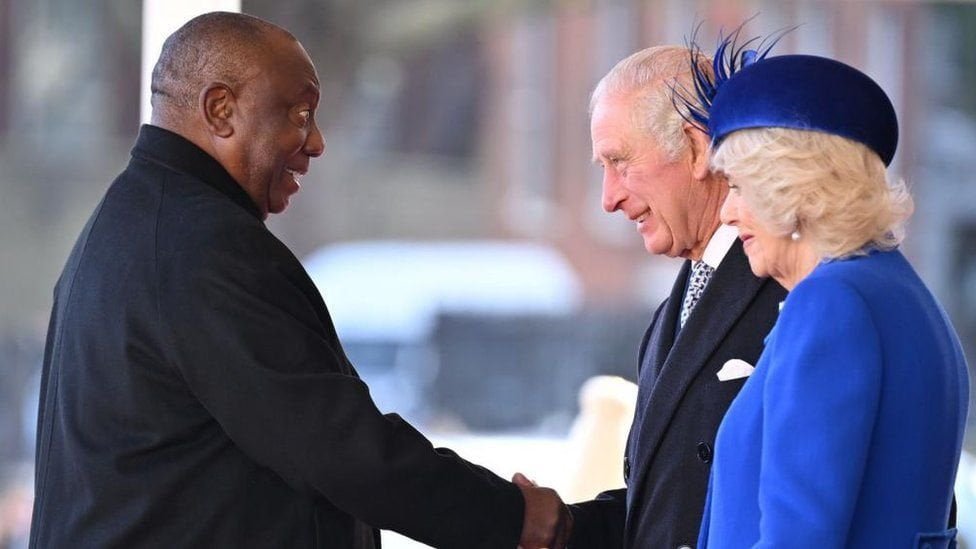South African President Makes First UK State Visit of King Charles’s Reign – The South African president has begun a two-day state visit to the United Kingdom, the first since King Charles ascended to the throne, with the Conservative government eager to focus on trade rather than challenge South Africa’s refusal to sanction Russia for its invasion of Ukraine. Because of Covid, Cyril Ramaphosa’s trip was significantly delayed, and he only happened to be the first state visit of the king’s reign.
South Africa, along with Turkey, India, and China, has been one of the major powers that has refused to impose sanctions on Russia, while Ramaphosa’s African National Congress (ANC) youth wing endorsed the sham referendums held in occupied Ukraine prior to the Kremlin’s illegal annexation of four regions. The Conservative prime minister, Rishi Sunak, is scheduled to meet with South African President Jacob Zuma in Downing Street on Wednesday, but the discussion has so far focused on how the two countries can work together to “turbocharge infrastructure investment and economic growth.”
People Also Read: U.K. to Celebrate King Charles’ Coronation With Bank Holiday in May, PM Rishi Sunak Announces
The United Kingdom is the largest state contributor to the $8.5 billion (£7.1 billion) pledged by Western partners to assist South Africa in transitioning away from its reliance on coal, according to Ramaphosa’s plan. South Africa would prefer that the loans be converted into grants. The first day of the visit is more focused on pageantry and the royal family’s hospitality at a state banquet, where the king will be joined by the Prince and Princess of Wales, who are also participating in their first state visit in their new roles.
The president was officially greeted by the prince and princess, who met him at the Corinthia London hotel on Tuesday before accompanying him to a ceremony at Horse Guards Parade. Ramaphosa was also given the opportunity to address both houses of parliament. Due to eye surgery, his wife, Dr Tshepo Motsepe, has not joined him, but the foreign minister, Dr Naledi Pando, has traveled with the entourage and met the British foreign secretary, James Cleverly. Pando has accused some European countries of “patronising bullying” by pressuring South Africa to choose between the West and Russia over Ukraine.
Ramaphosa arrives in the United Kingdom in need of a boost both at home and abroad. Since ousting his predecessor, Jacob Zuma, as leader of the ruling ANC amid a slew of corruption scandals five years ago and then winning a general election, the 70-year-moral old’s and political authority has been depleted. Unemployment is estimated to be 35%, and violent crime is rampant, all while Ramaphosa has struggled to rid the ANC of graft and implement much-needed changes that could help a flagging economy.
“There is a real danger for Ramaphosa that (the visit) will be viewed as too deferential to a colonial power. South Africa very much needs to feel that it is being listened to as an equal partner, not simply coming to kiss the ring of the new king,” said Chris Vandome, a senior research fellow at the Chatham House thinktank in London. “The British quite often get the narrative very wrong. They talk about a great historic friendship but the historical relationship is often viewed very differently in South Africa.”
He added: “South African reasons for neutrality on Ukraine are complicated: narratives of Soviet support for liberation are projected on to a lattice of personal relationships between some South African and Russian political and business leaders. More importantly, South Africa felt let down by the faltering response to calls for assistance from the west during Covid-19, including on vaccine distribution and manufacture at the height of the pandemic.”
People Also Read: Trump Files Lawsuit to Avoid Jan. 6 Committee Subpoena
Ramaphosa, a former labor activist turned tycoon, faces a difficult few weeks at home, with a parliamentary inquiry set to report on allegations that he abused his powers to cover up a theft of millions of dollars allegedly hidden at his game ranch. Though he is unlikely to be impeached, the corruption charges have hampered his efforts to root out corruption in government.
Ramaphosa, the likely candidate for general elections next year, will stand for re-election as party leader in mid-December. Analysts expect him to win both contests, but largely because there are few other figures who can build a successful coalition of different interest groups. At the party level, the ANC expects to be punished by voters for its failure to tackle South Africa’s deep problems and its own.




